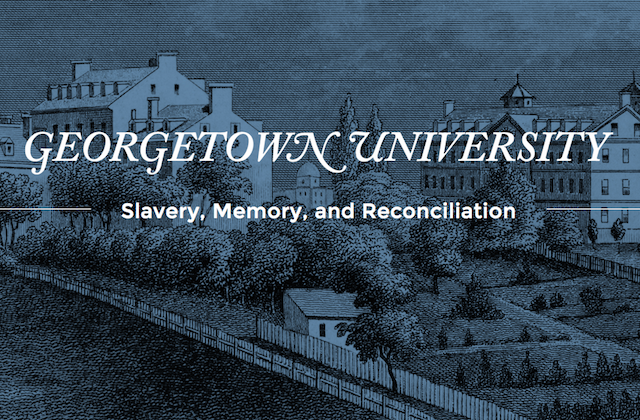World Reacts to Georgetown's Decision to Extend Preference to Descendants of Slaves

More than a year after Georgetown University student activists began calling on President John J. DeGioia to make amends for the school’s slave trading past, the Washington, D.C. institution is making major changes.
In a statement issued yesterday (September 1), DeGioia announced the outcome of the Working Group on Slavery, Memory and Reconciliation’s efforts to “explore this history, to engage the community in dialogue and to outline a set of recommendations to guide future efforts.”
The Working Group, which was convened last year, made several recommendations to that end in its 104-page report, including the following, from the statement:
- Name Freedom Hall (once known as Mulledy Hall) as Isaac Hall, in honor of Isaac, the enslaved person whose name is the first mentioned in the documents of the 1838 sale
- Name Remembrance Hall (once known as McSherry Hall) as Anne Marie Becraft Hall in honor of Anne Marie Becraft, a free woman of color who founded a school for black girls in the neighborhood of Georgetown in 1827. She later joined the newly founded Oblate Sisters of Providence in Baltimore, the oldest active Roman Catholic sisterhood in the Americas established by women of African descent
- Offer an apology for the University’s historical relationship with slavery
- Engage with the descendant community in an active and sustained manner
- Develop a public memorial to the enslaved to ensure their memory is honored and preserved
- Actively pursue research and teaching, establishing a new Institute for the Study of Slavery and Its Legacies at Georgetown
But the recommendation that has grabbed the most headlines relates to the descendants of the 272 slaves the university sold in 1838—for the equivalent of $3.3. million in today’s money—to keep the university running. DeGioia said that the school will institute an admissions preference for the descendants of not just the 272 people sold to plantations in Louisiana, but to all slaves whose bodies and work benefited the school. From the report: “If descendants choose to apply for admission to Georgetown, we suggest that they be accorded an advantaged status by virtue of this ancestry.”
The preference will be on par with students’ whose families were previously a part of the Georgetown community. It does not come with dedicated financial assistance, though the report suggests that the university should explore the feasibility of such a policy, and explicitly says the following about reparations: “While we acknowledge that the moral debt of slaveholding and the sale of the enslaved people can never be repaid, we are convinced that reparative justice requires a meaningful financial commitment from the university.”
The reaction to the news was mixed on social media, with some people viewing it as a good start, some questioning the logistics of the preferential admissions policy and others wondering how this move will impact other American institutions:
A beginning that can never be enough: Via @NPR: Georgetown To Offer An Edge In Admissions To Slaves' Descendants https://t.co/1edZe3EZmT
— Lisa Callaway Pate (@LCallawayPate) September 2, 2016
Georgetown isn't completely making amends for their role in selling slaves to enrich their school, but it's an important precedent to set.
— Boo Radley (@ClauGasol) September 1, 2016
How will #Georgetown identify, notify, and recruit the descendants of the 272 enslaved African Americans sold in 1838 to save it?
— Dorothy Roberts (@DorothyERoberts) September 1, 2016
Without offering scholarship help, expanding legacy admissions to descendants of 272 slaves appears as a PR move. https://t.co/rLwYPspVO9
— Max Blumenthal (@MaxBlumenthal) September 1, 2016
"We profited from selling your ancestors, so we'll move you to the front of the line to pay us money."
— Philip Bump (@pbump) September 1, 2016
https://t.co/MOQENxOJwt
If descendants of Georgetown slaves deserve compensation, why don't all black Americans? https://t.co/eITlQuK4mK pic.twitter.com/IqKa8lo8ae
— The Guardian (@guardian) September 1, 2016
if Georgetown is giving preferential treatment to the descendants of slaves because they built it, the White House has to follow suit right?
— Vann R. Newkirk II (@fivefifths) September 1, 2016
